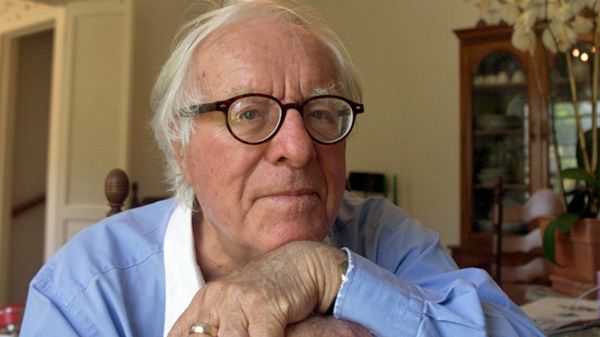
Author Ray Bradbury has died at age 91. Fuuuuuuck. He was not a perfect man, nor a perfect author, and we sure wouldn't have agreed on a lot of things, but there are few books I've revisited like I have Fahrenheit 451.
There are maybe only two books I've read more often. It is a deep part of me, and I never fail to be amazed how often I think about it, in relation to everything from censorship to the increasing enormity of flatscreen TVs. It has even featured centrally in several key moments in my life, because of shared appreciation.
Three days after we met online, Iain fatefully asked me, "Fancy a game of Fahrenheit 451? Which book would you memorize for posterity, and which would you throw onto the pyre?"
I didn't answer the former with Fahrenheit 451, but it wouldn't have been a bad alternative.
* * *
Bradbury was famously an irascible critic of "political correctness," so perhaps he would have found it ironic that it was Captain Beatty's treatise on "political correctness" in Fahrenheit 451 which really started my thinking on the difference between "political correctness" and meaningful sensitivity to marginalized people:
Now let's take up the minorities in our civilization, shall we? Bigger the population, the more minorities. Don't step on the toes of the dog lovers, the cat lovers, doctors, lawyers, merchants, chiefs, Mormons, Baptists, Unitarians, second-generation Chinese, Swedes, Italians, Germans, Texans, Brooklynites, Irishmen, people from Oregon or Mexico. The people in this book, this play, this TV serial are not meant to represent any actual painters, cartographers, mechanics anywhere. The bigger your market, Montag, the less you handle controversy, remember that! All the minor minor minorities with their navels to be kept clean. Authors, full of evil thoughts, lock up your typewriters. They did.This, I knew from the first time I read it, was wrong—though I wasn't certain precisely why yet. What I knew, viscerally, but could not articulate as a teenager, was that disappearing materials that reflect institutional harm, without or instead of any examination of systemic bias, is a solution to legitimate criticism of privilege, not a solution to harm. And trying to find a solution to legitimate criticism of privilege is the real partner to the anti-intellectualism also at the root of the tyranny in Fahrenheit 451, not the imagined (even by its author) solution to harm.
...Colored people don't like Little Black Sambo. Burn it. White people don't feel good about Uncle Tom's Cabin. Burn it. Someone's written a book on tobacco and cancer of the lungs? The cigarette people are weeping? Burn the book. Serenity, Montag. Peace, Montag. Take your fight outside. Better yet, into the incinerator.
Bradbury got that wrong. But its wrongness worked on me, and challenged me to figure out why it was wrong. It made me more sensitive. It helped me build my argument against careless rants about "political correctness" delivered by people of privilege who specialize in willful ignorance. It informed the charter for this space.
That would probably make Mr. Bradbury very grumpy indeed. Which makes me grin.
My condolences to his family, friends, and colleagues.




Shakesville is run as a safe space. First-time commenters: Please read Shakesville's Commenting Policy and Feminism 101 Section before commenting. We also do lots of in-thread moderation, so we ask that everyone read the entirety of any thread before commenting, to ensure compliance with any in-thread moderation. Thank you.
blog comments powered by Disqus